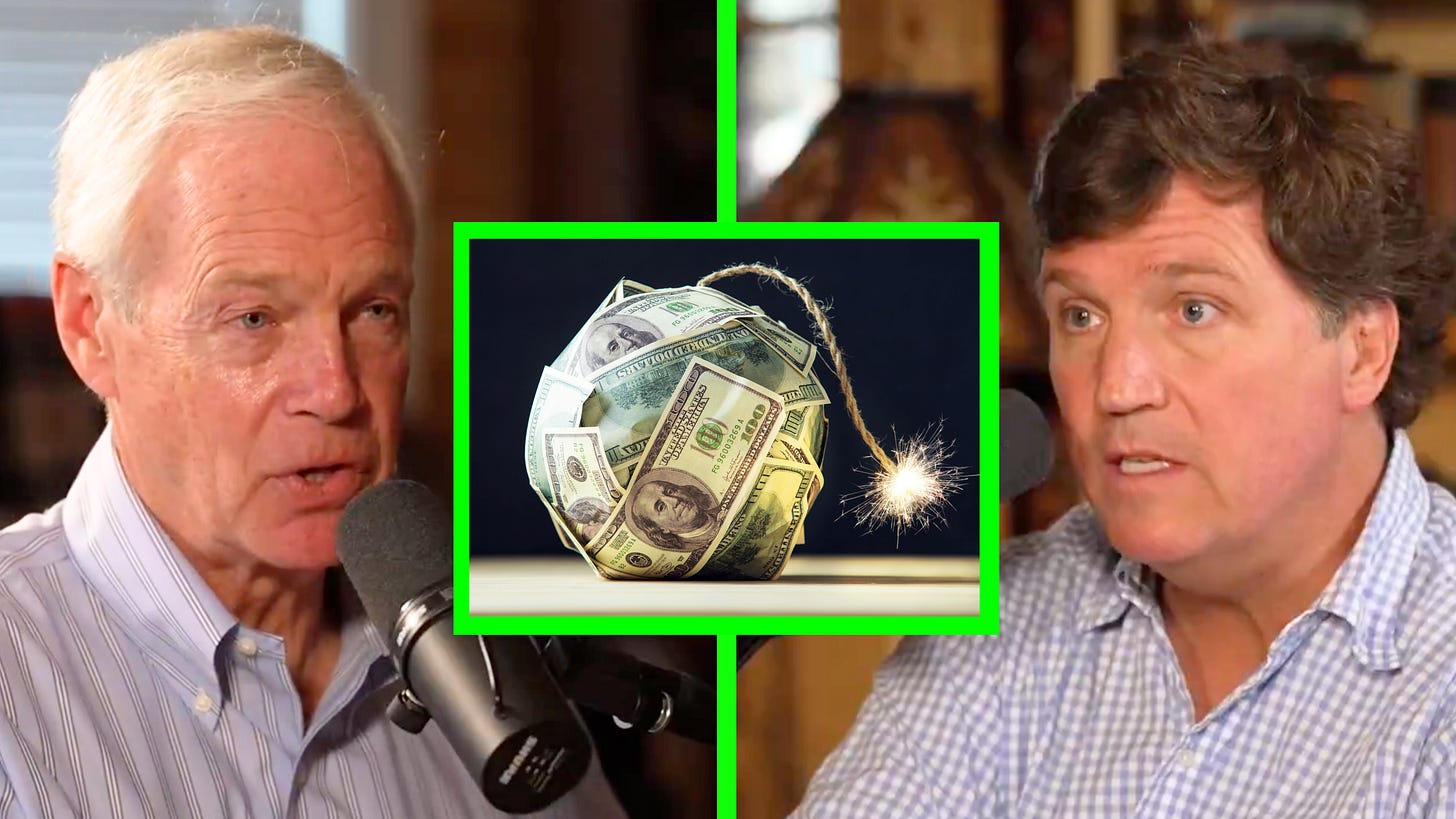

This article originally appeared on vigilantfox.com and was republished with permission.
The U.S. economy is a ticking time bomb—and Senator Ron Johnson isn’t sure how much time we’ve got left.
Why is your car insurance insane? Why is your grocery bill breaking the bank?
It all traces back to one thing: reckless government spending.
America is drowning in $37 trillion in debt, and Senator Johnson says we’re nearing the point of no return.
This is the warning D.C. insiders pray never goes public.
Senator Ron Johnson sat down with Tucker Carlson, and the interview opened with a moment that exposed just how clueless Congress really is about America’s finances.
“I just asked my colleagues, ‘Hey, anybody know how much we spent last year in total?’ Dead silence,” Johnson said.
He continued, “Understand the federal government is the largest financial entity in the world. We, in theory, are the 535 members of the board of directors. And nobody really knows in total how much the federal government spent because we never talk about it.”
That lack of accountability, Johnson explained, has let Congress quietly move nearly a trillion dollars in spending (on things that should be optional) into the “mandatory” category, so they no longer get reviewed or debated.
He then laid out the math. And these numbers that should terrify anyone paying attention:
- 2019 spending: $4.4 trillion
- 2024 spending: Over $7 trillion
- 2025 projected spending: $7.3 trillion
- Current revenue: Around $5.1 trillion
- Structural deficit: Approximately 6%
- Yearly deficit: Roughly $2.2 trillion
So, that’s a 66% INCREASE in spending in just six years.
“We’re almost $37 trillion in debt,” Johnson warned. “We’re spending $7 trillion, and CBO (Congressional Budget Office) projects over the next 10 years, we will add another $22 trillion to the debt.”
And that’s if nothing goes wrong. “If interest rates start creeping up… just one percentage point, add another $4 trillion,” he said.
Carlson asked what it all means in the real world. Johnson’s answer was simple: less money in your pocket. He said inflation is DIRECTLY TIED to excessive government spending.
“A dollar you held in 1998 is only worth 51 cents today,” he said—a figure that visibly stunned Carlson.
Johnson didn’t stop there. “A dollar we held just in 2019 is only worth 80 cents” today.
In other words, “a silent tax.”
So, in just six years, your buying power has plunged by as much as 20%.
Unless you’re one of the few whose income kept up with inflation, you’re feeling the effects of it pretty hard.
So what happens if the debt bomb finally explodes?
Johnson didn’t sugarcoat it: “It won’t be pleasant… It’ll be painful,” he warned.
And the people who will suffer the most, he said, are those living paycheck to paycheck—Americans who rely on government benefits and have no financial cushion to fall back on.
“If you’re living on different transfer payments or different types of welfare benefits, you may not get those,” Johnson explained.
“You can’t borrow more money, so you’re going to have to take what money we spend on other government programs and use it to service the debt. You have to pay it off—unless we want to go into full default,” he continued.
Carlson jumped in: “And that’s where you just say to Japan and China and Germany and everyone else who’s bought those bonds like we’re not paying.”
“Yeah,” Johnson replied. And that, he said, would be the end of the line.
“Which means you’ll never float more debt other than print more money, which then creates even more hyperinflation. So now people can’t afford anything.”
That’s when the system breaks.
Johnson pointed out that while smaller countries have defaulted and been bailed out or had their debt restructured, “Nobody can [bail us out]. We are… the world’s reserve currency.”
And if we lose that status? We lose the magical ability to print dollars that the world still values.
Looking ahead, Johnson said the way out isn’t complicated, but it will require real political will. He pointed to the post-WWII rollback in federal spending as a roadmap.
“We entered World War II, spending 11.7% of our economy’s GDP on the federal government. 11.7%. That got ramped up to 41% during the war. But by 1948, because we had responsible leaders… that actually went down to 11.4% of GDP. And we returned to pre-war level.”
Johnson says the same principle still applies. We ramped up spending during COVID to deal with the crisis, but now that it’s over, we should be scaling back to pre-pandemic levels.
Johnson says the “Big Beautiful Bill” doesn’t go nearly far enough—it barely scratches the surface. It promises $1.6 trillion in savings over 10 years.
But we’re on track to add $22 TRILLION in debt during that same time frame.
It doesn’t have to be this way. Americans deserve responsible spending.
“This is a once-in-a-lifetime opportunity here,” Johnson said. “Returning to a reasonable level is just so common sense and not that hard.”
And in Washington, that might be the most radical idea of all.
Had enough of reckless spending and exploding debt? Don’t just sit there—speak up. Demand change.
Contact your U.S. Representative: house.gov/representatives/find-your-representative
Contact your U.S. Senators: senate.gov/senators/senators-contact.htm
They work for you. Make them hear it.
Nothing gets done unless the pressure is unbearable because they only move when they feel the heat.
Watch the whole conversation below. Get informed. Get angry. Demand change from your government.
Find more stories like this at VigilantFox.com
The post What Happens When America’s Debt Bomb Explodes? appeared first on The Gateway Pundit.

